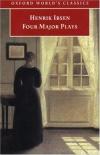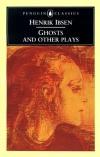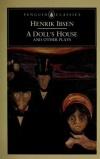
Four of Ibsen’s most important plays in superb modern translations, part of the new Penguin Ibsen series. With her assertion that she is “first and foremost a human being,” rather than a wife, mother or fragile doll, Nora Helmer sent shockwaves throughout Europe when she appeared in Henrik Ibsen’s greatest and most …

Hedda Gabler is a play written by Norwegian playwright Henrik Ibsen. It was published in 1890, and it premiered in 1891 in Germany to negative reviews, but has subsequently gained recognition as a classic of realism, nineteenth century theatre, and world drama. The title character Hedda, is considered one of the great …

This is a reproduction of a book published before 1923. This book may have occasional imperfections such as missing or blurred pages, poor pictures, errant marks, etc. that were either part of the original artifact, or were introduced by the scanning process. We believe this work is culturally important, and despite …

Ghosts is a play by the Norwegian playwright Henrik Ibsen. It was written in 1881 and first staged in 1882 in Chicago, Illinois, in a production by a Danish company on tour. Like many of Ibsen's plays, Ghosts is a scathing commentary on 19th-century morality. Because of its subject matter, which includes religion, …

Delivering three distinct and powerful visions of characters who choose to defy convention in the pursuit of happiness, Henrik Ibsen's A Doll's House and Other Plays is translated with an introduction by Peter Watts in Penguin Classics. The League of Youth was Ibsen's first venture into realistic social drama and …

An Enemy of the People is an 1882 play by Norwegian playwright Henrik Ibsen. Ibsen wrote it in response to the public outcry against his play Ghosts, which at that time was considered scandalous. Ghosts had challenged the hypocrisy of Victorian morality and was deemed indecent for its veiled references to syphilis. …

 English
English Español
Español Deutsch
Deutsch

